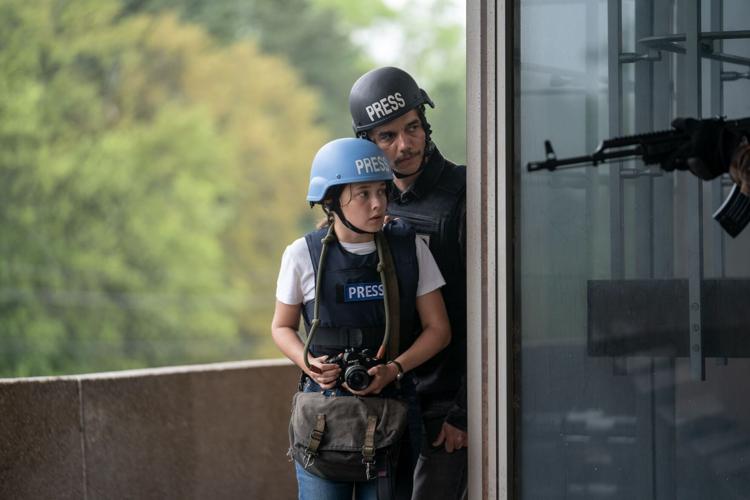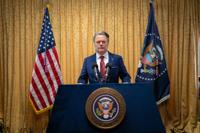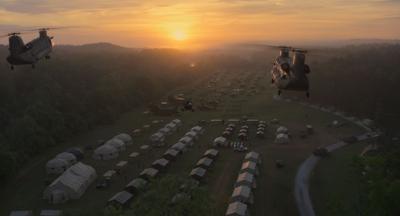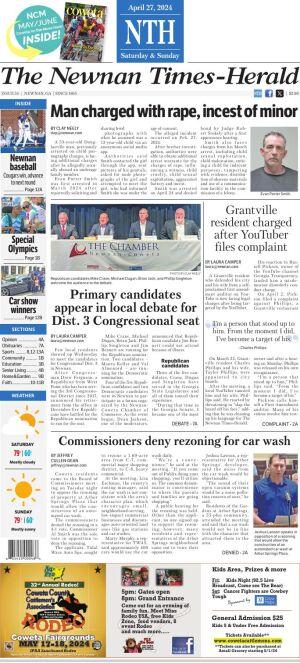To justify the muddled ambiguity of Civil War, it’s been said that director Alex “Garland’s film is a Rorschach test of America.” The idea is that in taking no discernable side, the varying interpretations will reveal the viewer’s subjective prejudices.
If you’re a Trump fan, you’ll see the project as an indictment of the media. After all, four years ago, former President Trump famously called the Fourth Estate “the enemy of the people.”
If you’re a Biden supporter, you’ll embrace Civil War as a harrowing cautionary tale about the dangers of political extremism. And after watching the film, that interpretation is an easy conclusion—the low-hanging fruit. In the movie, Nick Offerman plays a Trump-like leader serving his third term in office. I guess in this fictitious America, the 22nd Amendment has been repealed.

The wide disparity between readings of this action-packed, intense war picture is related to its startling lack of context. In one sequence, our protagonists happen upon a bombed-out JCPenney, the parking lot of which contains a downed nondescript military helicopter and several abandoned armored ground transports. A pitched, deadly battle went down in that place, but why? And who exactly were the combatants?
“…1, 2, 3, what’re we fighting for? don’t ask me, I don’t give a damn…” goes the Vietnam-era protest song. And one way to enjoy Civil War is not to try to understand it. Of course, that song was not a blissfully ignorant celebration of the cause to head off the falling dominos in Southeast Asia. It was a biting indictment of the wrong-headed justification and militant approach. Such a sophisticated, identifiable position is lacking in Civil War.

In "Civil War," the aftermath of a battle in a JCPenny parking lot offers us little in the way of answers to the cause of the conflict.
Writer/director Alex Garland is no stranger to the edgy, near-future, post-apocalyptic genre. Back in 2002, he wrote the marvelous horror thriller 28 Days Later, a movie that gave us haunting shots of an empty London ravaged by a virus that turned human beings into blood-thirsty zombies. But there was an established logic to that story.
28 Days Later played on the audience's familiarity with the zombie film that horror auteur George A. Romero had helped to birth way back in 1968. Greater context wasn’t required, but it was doled out anyway. In 28 Days, we instantly understood and accepted that a zombie horde had overtaken the well-developed and civilized UK, reducing it to a chaotic urban desert where the real monsters were the surviving uninfected.

Stephen McKinley Henderson in "Civil War."
When Garland moved behind the camera to direct in 2014, we got a near-masterpiece in “Ex Machina,” a story about creating a humanoid with a dangerous artificial intelligence that rivaled our brain’s abilities. The magic of that film was in isolating its players in a secret research facility where a young programmer observed, tested, and fell in love with Ava (Alicia Vikander), the shapely and wanton creation of a brilliant, billionaire mad man not too unlike a slightly more perverted Elon Musk.
But in keeping the world small, Garland didn’t have to wrestle narratively with the larger consequences associated with what happened after the artificial intelligence escaped into the whole wide world. Would the result be a similar wasteland to the one his hero Jim (Cillian Murphy) awoke to in 28 Days Later?
As the dangerous consequences of characters’ bad decisions escalate and expand, the story a filmmaker communicates becomes more challenging to manage. In Civil War, Garland’s solution to this unwieldy quandary is to tell his story of the national secession and penultimate final battle for the heart of America through the eyes and cameras of a small collection of journalists.
We meet seasoned war photographer Lee (Kirsten Dunst), her reporter partner Joel (Wagner Moura), and older jaded writer Sammy (a terrific Stephen McKinley Henderson). They are headed to Washington DC, hoping to get an interview, possibly the last, with the soon-to-be ousted President. Along the way, they pick up a war photographer-in-training named Jessie (“Priscilla” star Cailee Spaeny).
The film is an anxious and entertaining road picture told using the camera lenses of Lee and Jessie and the raw emotions of writers Joel and Sammy. It’s not complicated on one level to appreciate the mechanics of their quest. Still, its meaning is hopelessly scrambled, as if Garland doesn’t want to take any position out of fear of tipping his hand.

Cailee Spaeny and Wagner Moura in "Civil War."
Through pieces of exposition, we learn that the United States has fractured. The “Western Forces” of Texas, California, and other western states are closing in on Washington, DC. The war is on, and the Federal Government is on the verge of collapsing.
We are never given the inciting event that led us to such a violent outcome. Therefore, we have no idea who to root for. But trust me, there are bad guys in this movie; it’s just that their motivations are kept frustratingly cloaked.

Nick Offerman as a Trump-like presidential presence in "Civil War."
The President (Offerman) is said to be holed up in the White House, where the final battle is raging. The “front line” is centered in Charlottesville, Virginia. This city, in our world, was the infamous location for the deadly Unite the Right rally in 2017. Exactly why that town is the epicenter of the conflict in Civil War is patently obvious.
Garland is playing with our institutional knowledge by introducing a place we are familiar with, hoping it will evoke horror and add authenticity to his otherwise outlandish production. This technique is also employed in an off-handed mention of some kind of “Antifa massacre.” We don’t see those events, and the front line is only shown from a distance. The film attempts to blur the line between crushing reality and science fiction.
Georgians will instantly notice landmarks that are inconsistent with the road trip undertaken by the characters. It was frustrating to be told we were watching Virginia when it is clearly Georgia. But the vast majority of viewers won’t have that confusion.
The real problem with or maybe the twisted masterstroke of Civil War is its intentional equivocality. By providing nothing tangible to grasp onto, we are left to decipher the meaning of it all. Ordinarily, respect for the audience's intelligence in sorting out the theme and moral of a tale is to be lauded. But I suggest that despite the impressive display of Garland’s filmmaking talent, his hands-off narrative adds up to very little.


















